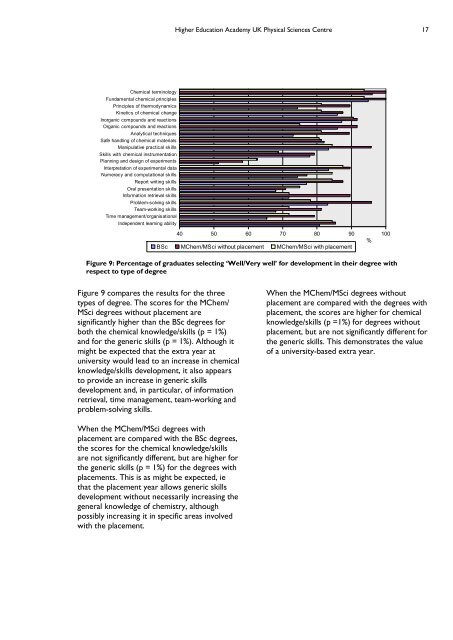Skills required by new chemistry graduates - Higher Education ...
Skills required by new chemistry graduates - Higher Education ...
Skills required by new chemistry graduates - Higher Education ...
Create successful ePaper yourself
Turn your PDF publications into a flip-book with our unique Google optimized e-Paper software.
<strong>Higher</strong> <strong>Education</strong> Academy UK Physical Sciences Centre 17<br />
Chemical terminology<br />
Fundamental chemical principles<br />
Principles of thermodynamics<br />
Kinetics of chemical change<br />
Inorganic compounds and reactions<br />
Organic compounds and reactions<br />
Analytical techniques<br />
Safe handling of chemical materials<br />
Manipulative practical skills<br />
<strong>Skills</strong> with chemical instrumentation<br />
Planning and design of experiments<br />
Interpretation of experimental data<br />
Numeracy and computational skills<br />
Report writing skills<br />
Oral presentation skills<br />
Information retrieval skills<br />
Problemsolving skills<br />
Teamworking skills<br />
Time management/organisational<br />
Independent learning ability<br />
40 50 60 70 80 90 100<br />
%<br />
BSc MChem/MSci without placement MChem/MSci with placement<br />
Figure 9: Percentage of <strong>graduates</strong> selecting ‘Well/Very well’ for development in their degree with<br />
respect to type of degree<br />
Figure 9 compares the results for the three<br />
types of degree. The scores for the MChem/<br />
MSci degrees without placement are<br />
significantly higher than the BSc degrees for<br />
both the chemical knowledge/skills (p = 1%)<br />
and for the generic skills (p = 1%). Although it<br />
might be expected that the extra year at<br />
university would lead to an increase in chemical<br />
knowledge/skills development, it also appears<br />
to provide an increase in generic skills<br />
development and, in particular, of information<br />
retrieval, time management, team-working and<br />
problem-solving skills.<br />
When the MChem/MSci degrees without<br />
placement are compared with the degrees with<br />
placement, the scores are higher for chemical<br />
knowledge/skills (p =1%) for degrees without<br />
placement, but are not significantly different for<br />
the generic skills. This demonstrates the value<br />
of a university-based extra year.<br />
When the MChem/MSci degrees with<br />
placement are compared with the BSc degrees,<br />
the scores for the chemical knowledge/skills<br />
are not significantly different, but are higher for<br />
the generic skills (p = 1%) for the degrees with<br />
placements. This is as might be expected, ie<br />
that the placement year allows generic skills<br />
development without necessarily increasing the<br />
general knowledge of <strong>chemistry</strong>, although<br />
possibly increasing it in specific areas involved<br />
with the placement.
















